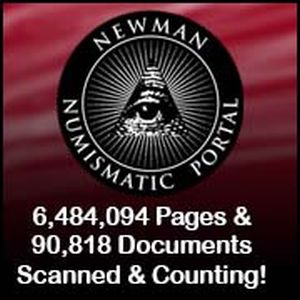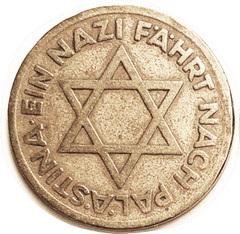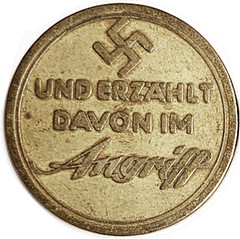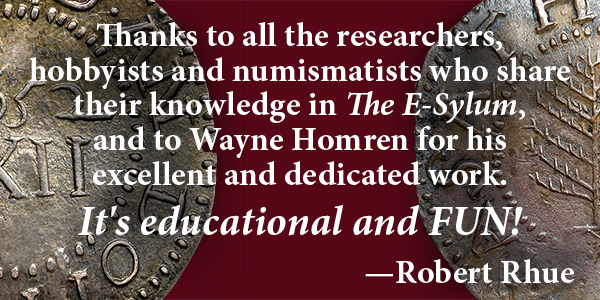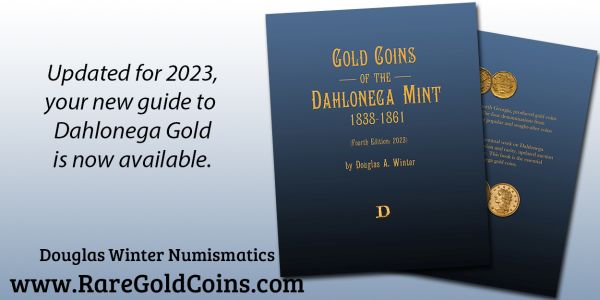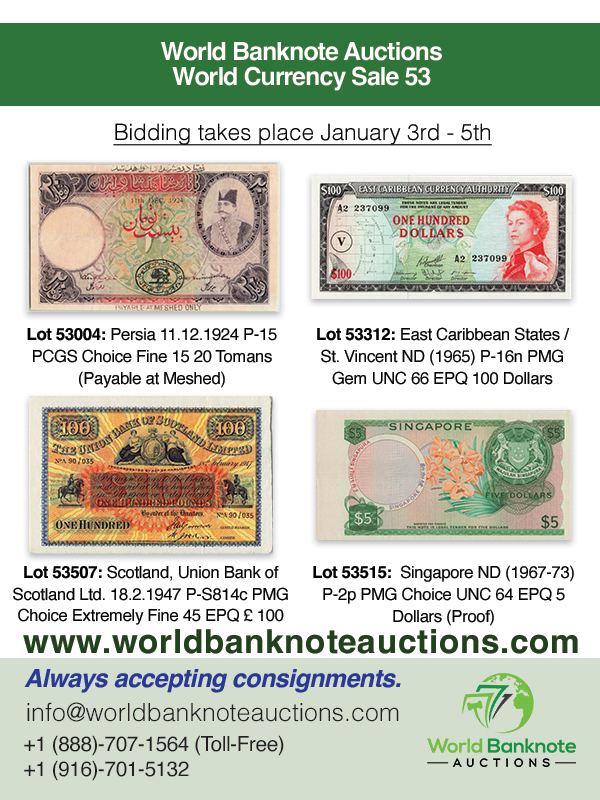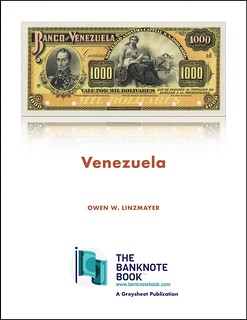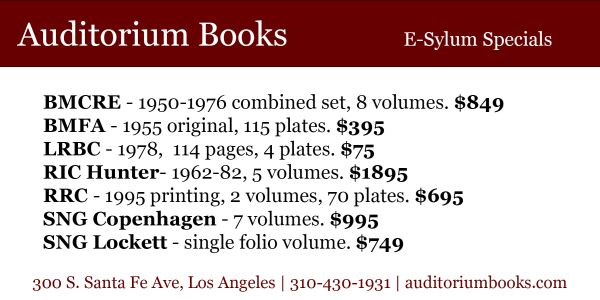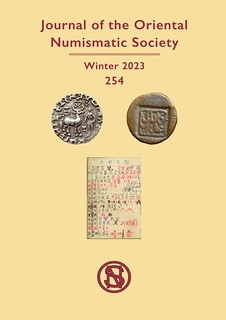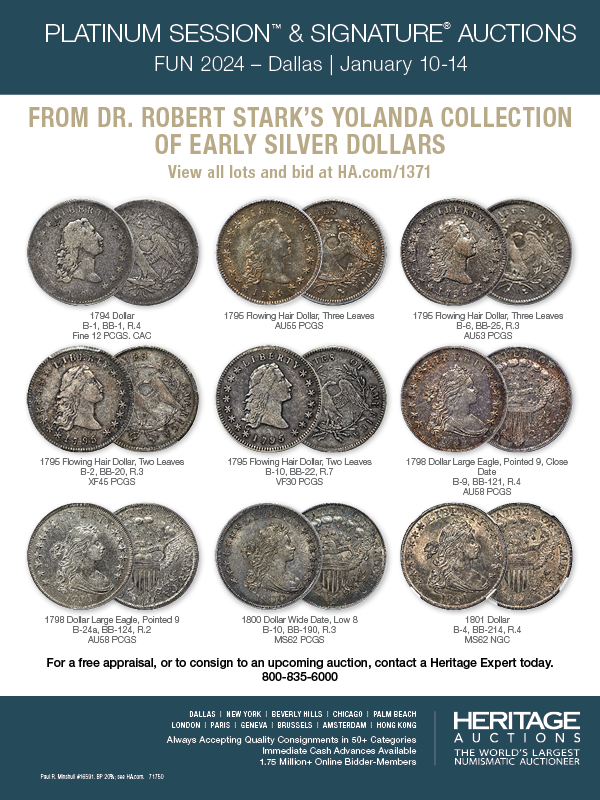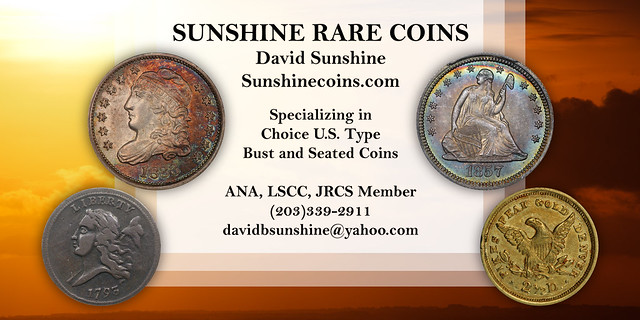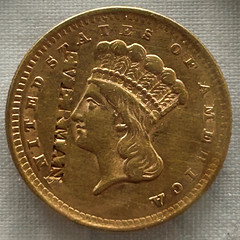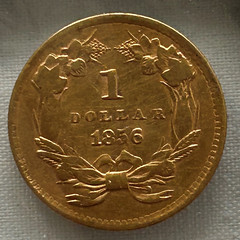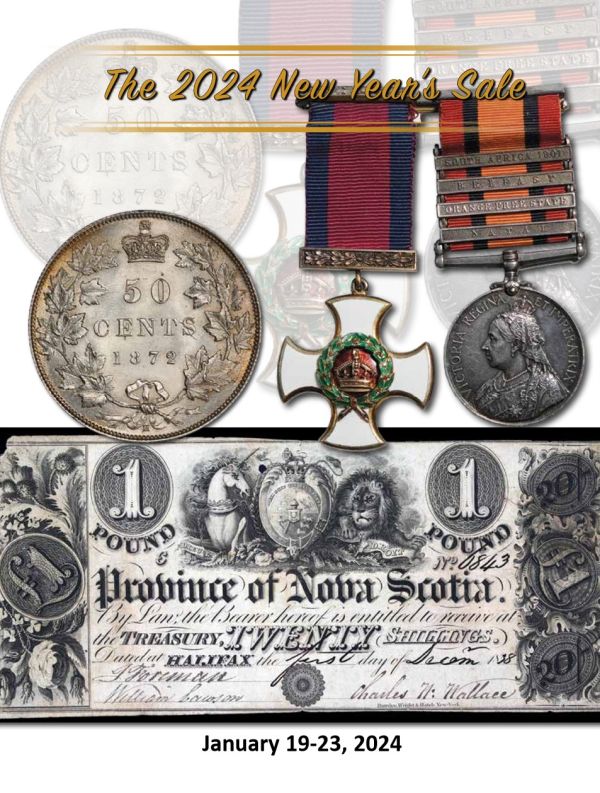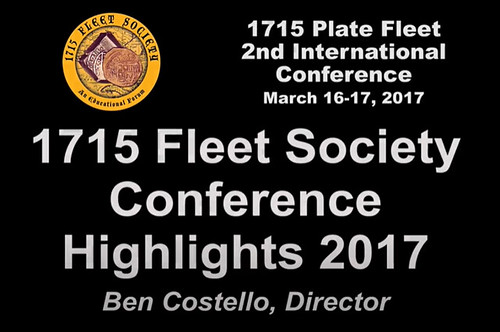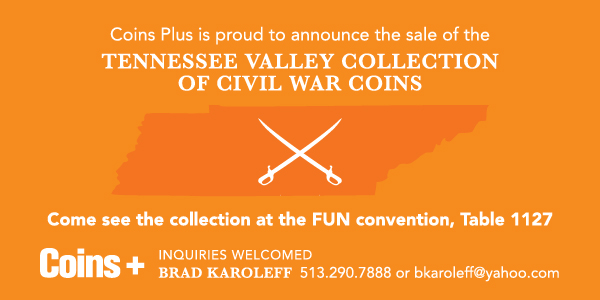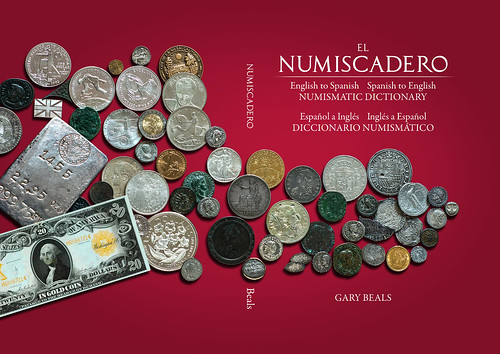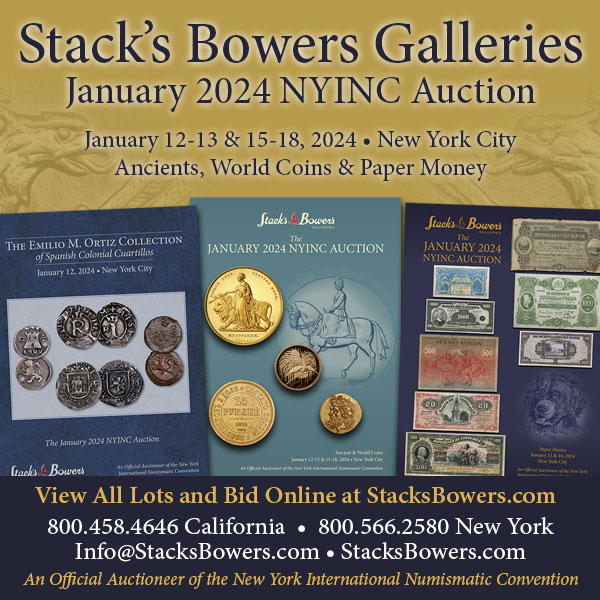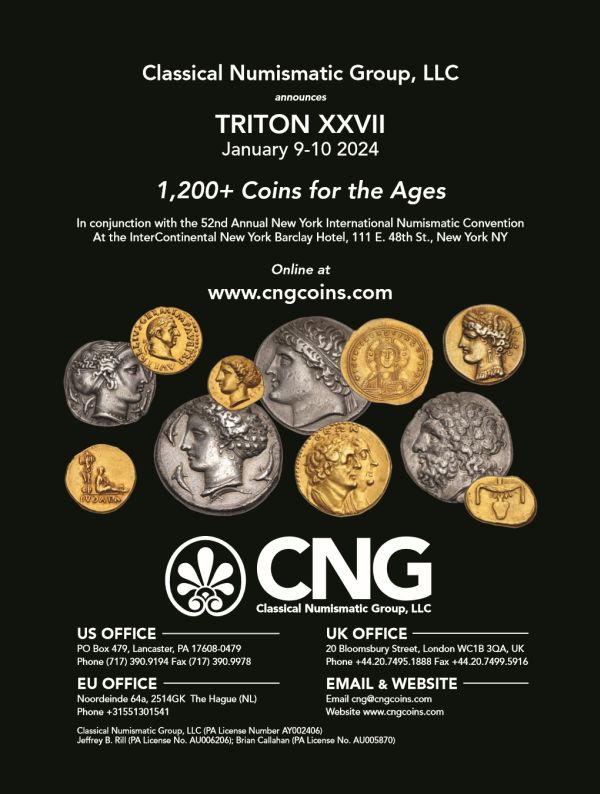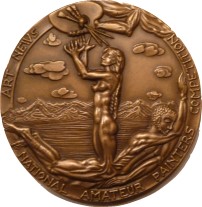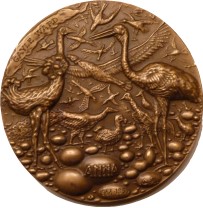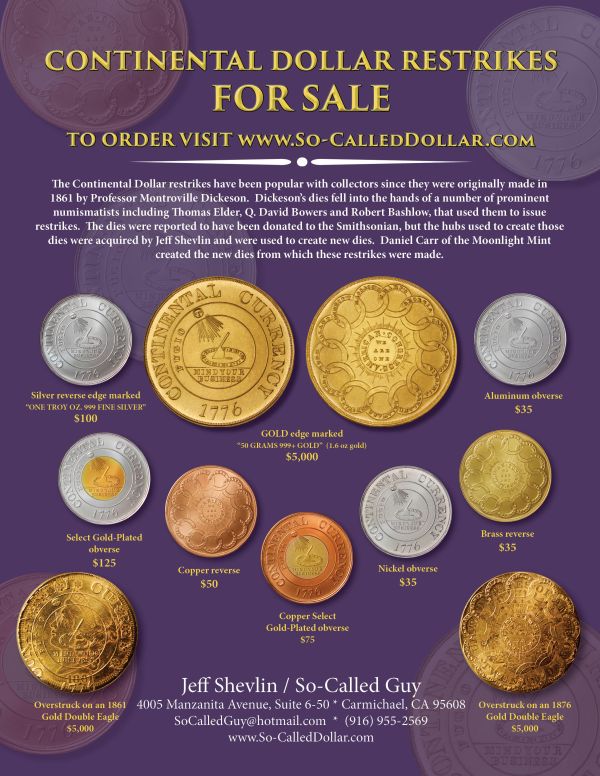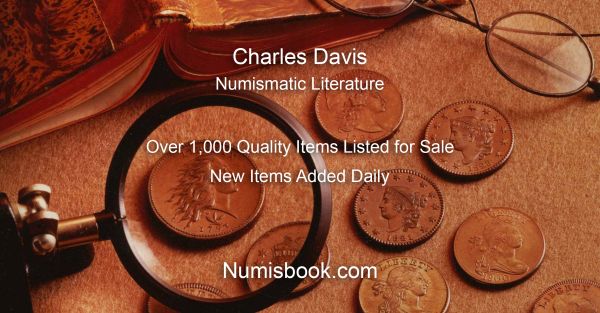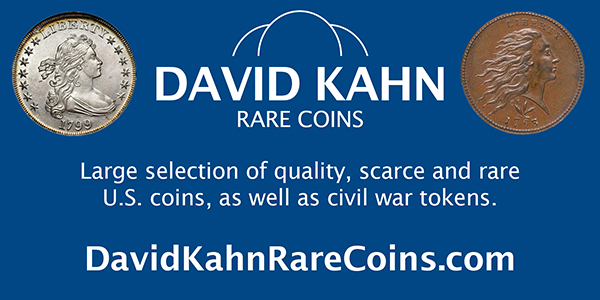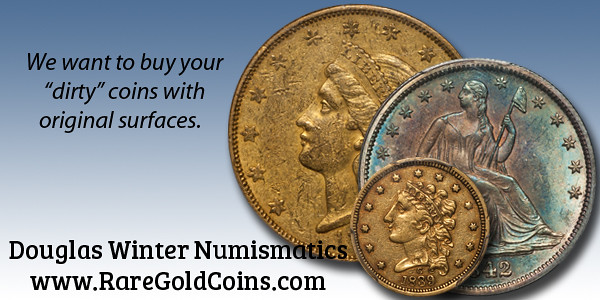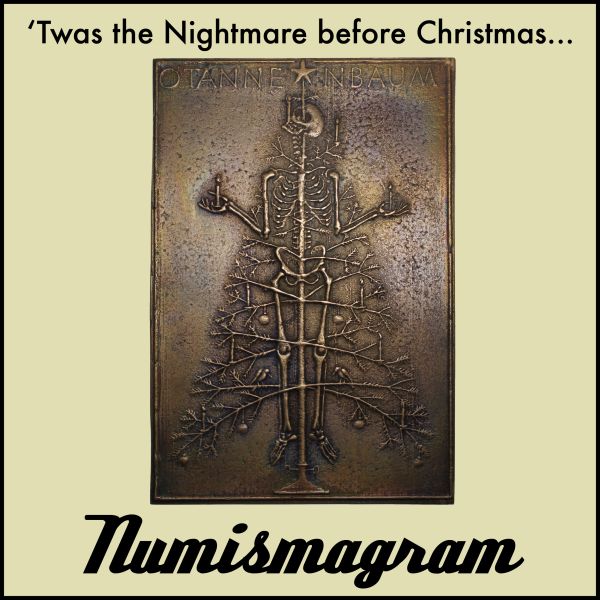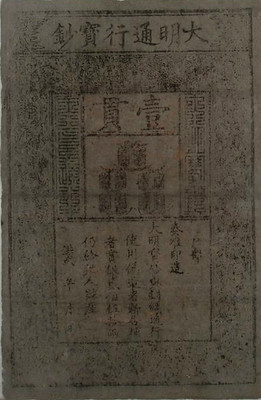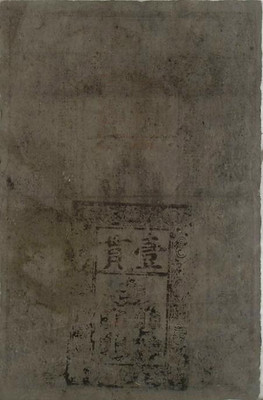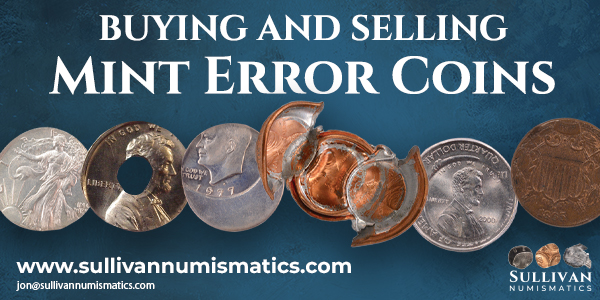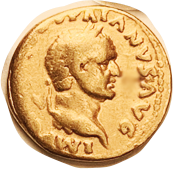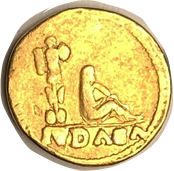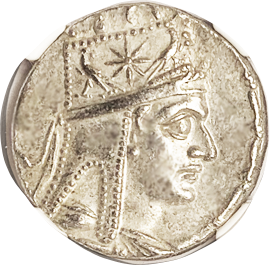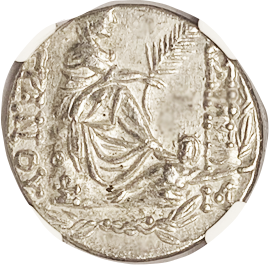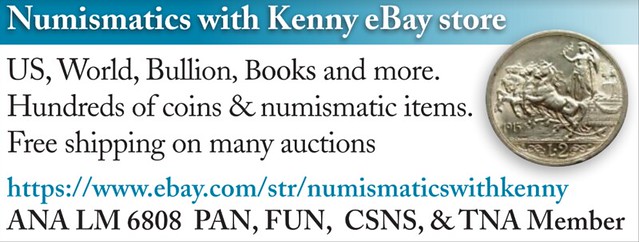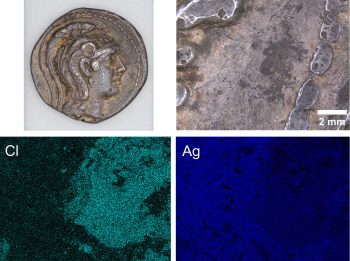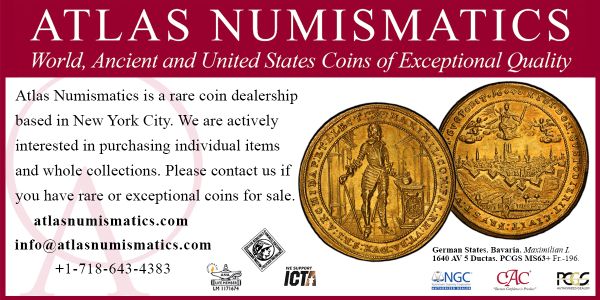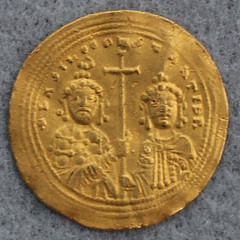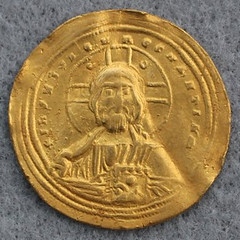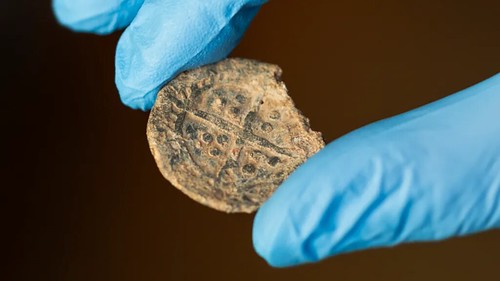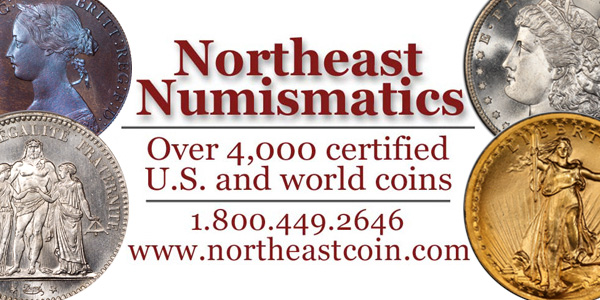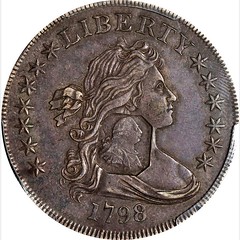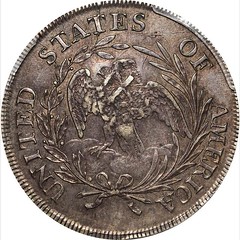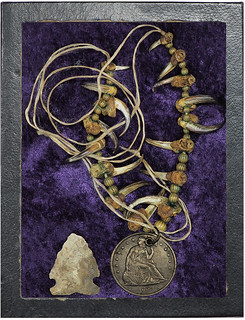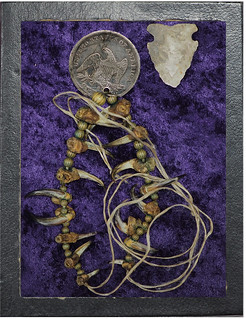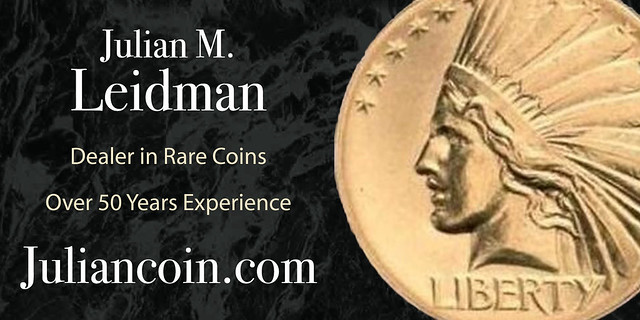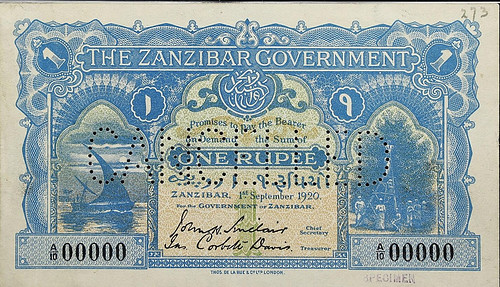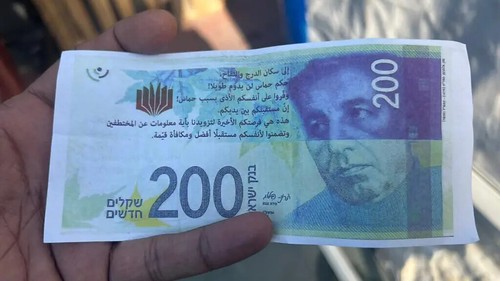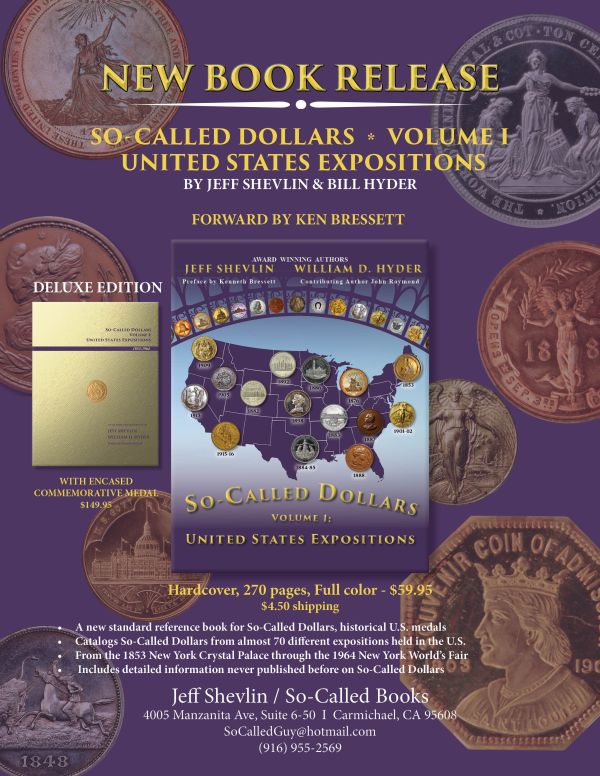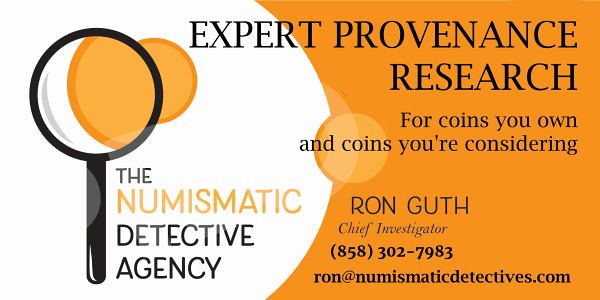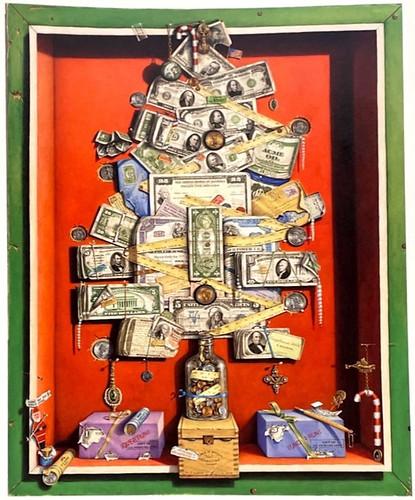
Visit our NBS Sponsors




About UsThe Numismatic Bibliomania Society is a non-profit association devoted to the study and enjoyment of numismatic literature. For more information please see our web site at coinbooks.org SubscriptionsThose wishing to become new E-Sylum subscribers (or wishing to Unsubscribe) can go to the following web page link MembershipThere is a membership application available on the web site Membership Application To join, print the application and return it with your check to the address printed on the application. Print/Digital membership is $40 to addresses in the U.S., and $60 elsewhere. A digital-only membership is available for $25. For those without web access, write to: Jeff Dickerson, Treasurer AsylumFor Asylum mailing address changes and other membership questions, contact Jeff at this email address: treasurer@coinbooks.org SubmissionsTo submit items for publication in The E-Sylum, write to the Editor at this address: whomren@gmail.com BUY THE BOOK BEFORE THE COINSale Calendar |
- WAYNE'S WORDS: THE E-SYLUM DECEMBER 24, 2023
- NUMISMATISCHES ANTIQUARIAT LANG AUCTION 1
- NEW BOOK: COLLECTING VINTAGE COIN BOARDS 3RD ED
- BANKNOTE BOOK VENEZUELA CHAPTER PUBLISHED
- ORIENTAL NUMISMATIC SOCIETY WINTER 2023
- REXFORD ADDISON STARK (1947-2023)
- BCD CATALOGS ARRIVE IN CHICAGO
- MORE ON THE EVERMAN COUNTERSTAMP
- VIDEO: 1715 FLEET SOCIETY 2017 CONFERENCE
- MORE ON THE MONEY MUSEUM
- AI-GENERATED COIN BOOK COVERS
- UPDATE: AI-POWERED APP NUMI
- NOTES FROM E-SYLUM READERS: DECEMBER 24, 2023
- ACQUIRING A 1788 R 4-G MASSACHUSETTS CENT
- DICKENS LAND LONDON 1941 MEDALS
- VOCABULARY TERM: OVERSIZE FLAN
- FREDERICK WILLIAM HARRIS (1872-1938)
- WBNA WORLD CURRENCY SALE 53
- FRANK S. ROBINSON 123ND AUCTION
- ROYAL ONTARIO MUSEUM'S ROMKOMMA PROJECT
- BYZANTINE COIN FIND IN NORWAY
- MEDIEVAL CHURCH CHRISTMAS TOKEN FOUND
- BANK OF ENGLAND COUNTERSTAMP ON 1798 DOLLAR
- 1859-O DOLLAR IN INDIAN TRADE NECKLACE
- 1920 ZANZIBAR 1 RUPEE SPECIMEN NOTE
- ISRAEL DROPS FAKE MONEY ON GAZA
- THE KING OF SILENT ANIMATION
- THE $100,000 GOODWILL STORE VASE
- THE WILD RIDE OF COLLECTIBLES
- JENNY LIND AND “SWIFT-MANIA”
- LOOSE CHANGE: DECEMBER 24, 2023
- OTIS KAYE’S HOLIDAY TREE OF MONEY
Content presented in The E-Sylum is not necessarily researched or independently fact-checked, and views expressed do not necessarily represent those of the Numismatic Bibliomania Society.
WAYNE'S WORDS: THE E-SYLUM DECEMBER 24, 2023
 New subscribers this week include:
Don Ackerman, courtesy of Alan Weinberg, who writes, "Don is head of Heritage’s historical / political dept and has been an authority and serious collector of political ephemera for decades and co-founder with
the late Jon Mann of The Railsplitter which is now online."
Welcome aboard!
New subscribers this week include:
Don Ackerman, courtesy of Alan Weinberg, who writes, "Don is head of Heritage’s historical / political dept and has been an authority and serious collector of political ephemera for decades and co-founder with
the late Jon Mann of The Railsplitter which is now online."
Welcome aboard!
Thank you for reading The E-Sylum. If you enjoy it, please send me the email addresses of friends you think may enjoy it as well and I'll send them a subscription. Contact me at whomren@gmail.com anytime regarding your subscription, or questions, comments or suggestions about our content.
As noted earlier, this issue and the next one are arriving late because of the holidays. This week we open with a numismatic literature auction, two new books, a periodical, a library on the move, updates from the Newman Numismatic Portal, and more.
Other topics this week include coin boards, counterstamps, the 1715 fleet, AI in numismatics, Massachusetts cents, oversize flans, Rev. Fred Harris, auction reviews, fake banknotes in Gaza, Jenny Lind and Otis Kaye.
To learn more about Venezuela banknotes, Chinese coin charms, Rex Stark, the BCD library, the Money Museum of the National Bank of Detroit, the Numi app, Charlotte Mint superintendent and chief assayer Stuart Cramer, Dickins Land medals, Russian Cheese Money, Ming dynasty notes, the posthumous Dupondius, the Nazi who traveled to Palestine, and the world's largest portable money museum, read on. Have a great week, everyone!
Wayne Homren
Editor, The E-Sylum
NUMISMATISCHES ANTIQUARIAT LANG AUCTION 1
Here's the announcement for the first numismatic literature auction from Numismatisches Antiquariat Lang. -Editor
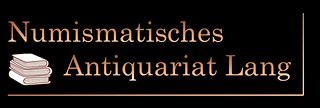 1st auction of numismatic literature at the Numismatische Antiquariat Lang GmbH on January 07, 2024
1st auction of numismatic literature at the Numismatische Antiquariat Lang GmbH on January 07, 2024
Auction 1 of the Numismatisches Antiquariat Lang will offer 1328 lots of numismatic literature on January 07, 2024. The auction begins with a lot of bibliophile works. These include numerous rare books and magnificent volumes. This will be followed by general literature and a wide range of ancient numismatic titles. Three original editions are particularly noteworthy: Svorono's work "Ta Nomismata tou Kratous ton Ptolemaion" in a beautiful uniform half leather (lot 282), Haeberlin "Aes Grave Das Schwergeld Roms" (lot 180) and Ravel "Descriptive catalogue of the collection of Tarentine coins formed by M. P. Vlasto" (lot 250).
NEW BOOK: COLLECTING VINTAGE COIN BOARDS 3RD ED
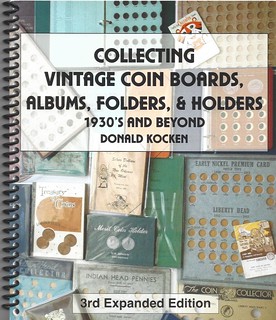 A new edition of Donald Kocken's book is available. He is also offering his massive lifetime collection for sale - this is a great opportunity for the next generation of collectors.
-Editor
A new edition of Donald Kocken's book is available. He is also offering his massive lifetime collection for sale - this is a great opportunity for the next generation of collectors.
-Editor
Collecting Vintage Coin Boards, Albums, Folders, & Holders - 1930s and Beyond
by Donald Kocken
Pages: 101
Format: Softbound, Spiral Bound
Images: Color
Edition: Third
Here are some sample pages. -Editor
BANKNOTE BOOK VENEZUELA CHAPTER PUBLISHED
A new chapter of The Banknote Book by Owen Linzmayer has been published by CDN - a complete 114-page catalog covering 1,310 varieties of notes from all three national and 30 regional issuers in Venezuela from 1811 to present. -Editor
ORIENTAL NUMISMATIC SOCIETY WINTER 2023
The Winter 2023 issue of the Journal of the Oriental Numismatic Society has been published. -Editor
Journal of the Oriental Numismatic Society
Winter 2023
CONTENTS
Some Rare Kuninda Coins
Devendra Handa
An unknown and unusual imitation of the Athenian owl
Patrick Pasmans
Phanebal of Ascalon: a question of attribution and gender
Marvin W. Kushnet
A Kanishka I forgery
Nikolaus Schindel
A Chinese coin found in the medieval town of Handoga (Djibouti)
Jorge de Torres-Rodriguez and Joe Cribb
Kabul’s rare 1/2-tankas of Akbar
B. Millancourt
Four copper coins of early Safavid rulers
B. Millancourt
The Burger Collection of Chinese coin charms
Alex C. Fang and Joe Cribb
Khaksar currency
Sanjay Garg
Ashoka Prize 2002
ONS News
Book reviews and notices
THE BOOK BAZARRE
REXFORD ADDISON STARK (1947-2023)
Political Americana dealer Rex Stark passed away on December 14th. Alan Weinberg submitted this remembrance. -Editor
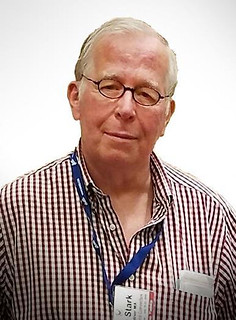 “Ask Rex” was a phrase widely used in the Americana collectibles and political ephemera field for many years. Rex Stark died in mid-December while hospitalized in Massachusetts for a multi years-long battle with cancer.
“Ask Rex” was a phrase widely used in the Americana collectibles and political ephemera field for many years. Rex Stark died in mid-December while hospitalized in Massachusetts for a multi years-long battle with cancer.
He’d been seen in recent years at major shows experiencing discomfort from medical treatments for cancer, all to little avail. Despite this, Rex was scheduled to attend FUN Orlando early January but fate intervened.
Rex lived for many decades with his wife Patti in Gardner, Massachusetts although they recently bought a second home in Tennessee.
Rex started his dealing / collecting in American “smalls” while working for and under the tutelage of Ben Corning who back in the 1970’s issued fixed price catalogues. Rex went on to be super-knowledgeable in scrimshaw, American historical porcelain, political memorabilia and really rare American coinage, and widely encouraged and contributed to specialized book references in these fields.
Realizing a dealer cannot collect fields that compete with his clients, Rex built a world class collection of ceramics and related items pertaining to John Brown, the Civil War era abolitionist and insurrectionist hanged by the federal government in 1860 - a person and related events made famous in more than one Hollywood movie, most notably one where Brown was played by noted actor Raymond Massey.
BCD CATALOGS ARRIVE IN CHICAGO
Shanna Schmidt published this report in her email Newsletter #211 this week about the arrival of the auction catalog section of Basil Demetriadi's famous library of Greek numismatics. Great news! -Editor
Right now I am working feverishly to empty 490 boxes of catalogs that we just received from Athens, Greece. The long awaited BCD catalogs (not to be confused with the BCD numismatic literature auction that is being sold by Kolbe & Fanning starting in February, 2024) arrived by ship and were finally delivered after a year in the making. While I am excited to have this monumental and important reference library, I also understand the weighty responsibility it carries. The library was cared for and treasured by Basil and his librarian Patricia for several decades. It was also heavily utilized and shared with scholars across the world. I know that its impact on numismatic study was very important and I don’t take it lightly.
MORE ON THE EVERMAN COUNTERSTAMP
Newman Numismatic Portal Project Coordinator Len Augsburger provided the following report. -Editor
More on the EVERMAN Counterstamp
A Newman Portal user asked about an EVERMAN counterstamp on an 1856 dollar. The counterstamp is listed in the Brunk reference, there on an 1852 Augustus Humbert $50 gold “slug.” Eric Schena added to the story in the June 2015 Numismatist, noting other EVERMAN pieces including an 1854 gold dollar, 1854 quarter eagle, and two 1855-O half dollars. Eric’s best guess as to the identity of the maker was Louis Everman, a silversmith in Carroll County, TN.
VIDEO: 1715 FLEET SOCIETY 2017 CONFERENCE
The David Lisot Video Library on the Newman Numismatic Portal can be found at:
https://nnp.wustl.edu/library/multimediadetail/522852
We highlight one of his videos each week in The E-Sylum. Here's one from 2017 at the 1715 Fleet Society Conference. -Editor
MORE ON THE MONEY MUSEUM
Howard R. Engel of Richard Stockley Books ( richardstockleybooks@mymts.net ) addressed these comments to John Regitko, author of the earlier article on the Money Museum of the National Bank of Detroit (linked below). Published here with permission. -Editor
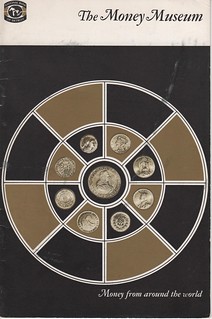 I read with great interest your intriguing article on the "Money Museum of the National Bank of Detroit" in the Nov. 19/23 issue of The E-Sylum, no. 26 no. 47, article 14. Many thanks for sharing it and bringing it to the attention of E-Sylum readers like yours truly. I happen to have a version of the booklet in my stock that is different from the two illustrated in the article.
I read with great interest your intriguing article on the "Money Museum of the National Bank of Detroit" in the Nov. 19/23 issue of The E-Sylum, no. 26 no. 47, article 14. Many thanks for sharing it and bringing it to the attention of E-Sylum readers like yours truly. I happen to have a version of the booklet in my stock that is different from the two illustrated in the article.
National Bank of Detroit. The Money Museum: Money from around the world. Detroit: The Bank, 1966. [12] p. : ill. ; original stapled graphic card covers that show some rubbing and a crease in the top right-hand corner; near fine, $35, plus shipping.
AI-GENERATED COIN BOOK COVERS
Last week Ron Guth announced that he'd written A Practical Guide To Becoming A Coin Dealer with help from a robot friend. There was no cover illustration yet, so I invited our readers to submit candidates, with or without the help of AI tools. First up is author Gary Beals. -Editor
OK robot – here is your book cover —
Well, what the hell, humans failed me for the most part — In 2015 I put 1,950 hours into my numismatic dictionary plus $8,000 or so in production and printing of 1,000 copies of the 352-page book. I wonder how many hours the robot would have needed?
UPDATE: AI-POWERED APP NUMI
Justin Hinh submitted this update on his AI-powered coin grading and identification app. Thank you! -Editor
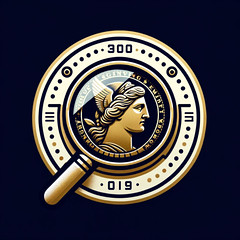 I wanted to share an update on Numi with you and E-Sylum readers.
I wanted to share an update on Numi with you and E-Sylum readers.
I revamped my AI grading and identification app Numi to v1.33 to use the official American Numismatic Association's grading standards. My goal was to transform Numi to focus solely on technical grading, as technical grading is much more objective as compared to market grading.
Attached are some results for coins ranging from G-4 to PR-70.
As you can see, the results were quite off. With Numi getting increasingly accurate as the coin moved to a better condition.
Numi struggles quite a bit with recognizing wear on a coin. Interestingly enough, this was the exact issue Compugrade experienced back in the 90's. Even though their algorithms were completely different than today's AI Large Language Models.
NOTES FROM E-SYLUM READERS: DECEMBER 24, 2023
National Amateur Painters Competition Medal
Scott Miller writes:
"Regarding your notice about David Smith and his Medals for Dishonor, I thought you might be interested in this other medal by him. In 1949, David Smith was commissioned by Art News to create a prize medal for the National Amateur Painters Competition. He signed the 70mm medal on the reverse with the Greek letters ? S. The example here was awarded to Gayle Ward for the 1954-1955 competition."
Thank you - nice medal. -Editor
Judy Blackman edits the Nashua Numismatist for the Nashua Coin Club. She writes:
"This is so funny Wayne. I just put the Medals of Dishonor (14 of the 15) in an article in the NCC newsletter (Jan. issue) as there is already a 2-page article and asked the other members of the team to not submit anything on him for our 20th century artistic medals topic, and then today I open my E-Sylum and there’s two articles pertaining to David and his medals. I was missing the book in our article, so I’m going to add that. Just letting you know Wayne, as I didn’t want you to think I stole your idea and content. David was a remarkable artist to document some very serious times in our world history. As always Wayne, thanks so much for all that you do!"
Great minds think alike! Actually, I don't think I'd ever heard of David Smith until I saw the Harvard press release. He did great work! -Editor
For more on Smith's life and work, see:
More than a Man, Less than a Painter: David Smith in the Popular Press, 1938–1966
(https://www.mdpi.com/2076-0752/12/4/153)
To read the earlier E-Sylum articles, see:
DAVID SMITH'S MEDALS FOR DISHONOR
(https://www.coinbooks.org/v26/esylum_v26n51a26.html)
MORE ON MEDALS FOR DISHONOR
(https://www.coinbooks.org/v26/esylum_v26n51a27.html)
Other topics this week include dealer Michael Kirzner, Charlotte Mint chief assayer Stuart Cramer, coin weights, and the pooping pooch counterstamp. -Editor
ACQUIRING A 1788 R 4-G MASSACHUSETTS CENT
Jeff Burke submitted this article about his recent acquisition of a nice 1788 Massachusetts Cent. Thank you! -Editor
Jeff Burke
From childhood, I learned about my family roots in colonial New England. Our Brewster genealogical records, on my mother’s side of the family, trace our family ancestry back to the Mayflower, with many generations residing in Massachusetts. We are the direct descendants (14th generation!) of Elder William Brewster, a passenger on the Mayflower (for more information on him, see the entry on “Brewster-William,” mayflowerhistory.com).
Coincidentally, Beth, my wife, and I had the chance to explore Massachusetts a bit when I was a visiting professor at College of the Holy Cross in 2007 to 2008. I recall finding and checking out many numismatic books at the Worcester Public Library and attending local coin shows. I drove into Boston to attend the Bay State Show at the Radisson Hotel in 2008. It was my first time attending such a major coin show!
DICKENS LAND LONDON 1941 MEDALS
Back in 2012 Philip Mernick asked about two bronze medals depicting Dickensian characters with the inscription FROM DICKENS LAND LONDON 1941. He wrote, "1941 London was not the time or place for exhibitions or medal making. Could they be American?" I don't believe we've gotten an answer about their origin. -Editor
A website visitor writes:
"My name is Ejner Thomsen from Copenhagen. I am writing in connection with a house conversion in London where I found these medals. Looked on Google for answers for these and found them mentioned by you in 2012. Can't contribute more news than sending photos of the 6 different ones I have."
VOCABULARY TERM: OVERSIZE FLAN
Here's a short entry from Dick Johnson's Encyclopedia of Coin and Medal Terminology. I was unable to locate an image of the medal mentioned. Are there examples of coins struck this way? Can anyone help? Thanks. -Editor
Oversize Flan. A blank larger than intended for a particular coin or medal. Oversize flans will clog or otherwise mis-strike in a coining press (because of collar dies). Open face dies can easily strike oversize flans and are occasionally used to create medals larger than dies employed. A recent example, the Haile Selassie Medal for the New York Rotary Club, 1 1/2-inch, was struck from two 1 1/4-inch dies; the resulting 1/8-inch border was inscribed with lettering. The wide border on such pieces has a tendency to bow up as the center is struck and becomes depressed. Oversize blanks are always used in proving newly cut dies, and often used in die trials.
FREDERICK WILLIAM HARRIS (1872-1938)
E-Sylum Feature Writer and American Numismatic Biographies author Pete Smith submitted this article on Rev. Fred Harris and the Harris portable money museum. Thanks! -Editor
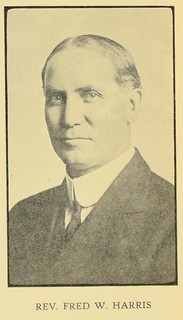 Fred W. Harris came to my attention while compiling a list of money museums in the United
States. I was not familiar with his extensive collection and its museum.
Fred W. Harris came to my attention while compiling a list of money museums in the United
States. I was not familiar with his extensive collection and its museum.
This story should begin with his birth on May 23, 1872. There is a record for his Christening at Fenny Compton, England, on June 30, 1872. The 1880 Census shows his family living in Bloomington, Wisconsin, with older siblings born in England and younger sisters born in Wisconsin. This would indicate the family moved to America in late 1872 or early 1873. Perhaps as a good Christian, he was born again because the 1920 and 1930 Census gives his place of birth as Wisconsin. His obituary gives his place of birth as Bagley, Wisconsin. He retained the same parents, John Henry Harris (1843-1909) and Sarah Rachel Print Harris (1843-1922).
On August 14, 1889, Fred Harris caught a fourteen-pound blue catfish south of Prairie du Chien. The next morning, he took it into town and sold it to James Harvey for fifteen cents paid with a piece of fifteen cents currency. He saved that piece and built a museum around it.
WBNA WORLD CURRENCY SALE 53
Consignment Director Ryan Baum of World Banknote Auctions sent along these highlights and comments on their upcoming World Currency Sale 53. Thanks. Great notes! -Editor
I always am interested in the oldest banknotes by country or continent. In our current sale we feature one of the oldest on a global basis from over six hundred years ago. The image appears dark and the oversized holder cloudy because of the fiber of the note.
Only the third example of what is considered one of the earliest collectible banknotes we have handled. While the printing of banknotes in China had been fairly well established at this point (Marco Polo was familiar with earlier issues), surviving notes dating prior to 1368 are extremely rare and can be considered non-collectible for all intents and purposes. The Ming dynasty notes are more available, thanks to a few groups that were found in the early 20th century. Most are seen in various states of conservation, but all examples are very collectible, and examples of this historic banknote are always in demand. This example retains strong eye-appeal, and the stains mentioned PMG are not distracting and very minimal and in our opinion should probably not even be mentioned. PMG mentions "Stains".
To read the complete lot description, see:
China / Ming Dynasty ND (1368-99) P-AA10 PMG Very Fine 30 1 Kuan
(https://bid.worldbanknoteauctions.com/lots/view/4-C7WAZC/china-ming-dynasty-nd-1368-99-p-aa10-pmg-very-fine-30-1-kuan)
FRANK S. ROBINSON 123ND AUCTION
Here's the announcement for dealer Frank S. Robinson's January 23, 2024 sale. -Editor
Dealer Frank S. Robinson will conduct his 123rd mail and internet auction of Ancient and Early Coins with a closing date of January 23. The sale will include 577 lots, low minimum bids, and bids to be reduced as competition permits. Robinson notes that reductions have averaged 15-20% in his recent sales. There is no buyer fee.
Featured in this sale is a further segment of a major collection of Judaean and Judaic related material, including some rare and important items. Highlights include a Judaea aureus of Vespasian, and an extremely rare Caracalla Tetradrachm of Aelia Capitolina (Jerusalem).
Greek coins include a slabbed AU Armenian Trigranes II Tetradrachm; several classic Athenian “Owl” tetradrachms in choice quality; an EF Baktrian Tetradrachm of Antimachos; a rare Elymais silver Tetradrachm of Kamnaskires V in Choice EF; an AVF archaic Kaulonia stater; an unusually choice Mint State coin of the last Parthian ruler, Artabanus VI; and a rare EF Tetradrachm of Vadfradad I of Persis.
ROYAL ONTARIO MUSEUM'S ROMKOMMA PROJECT
A project connected to the Royal Ontario Museum's ancient Greek coin collection is studying environmental degradation to guide conservation efforts. -Editor
One of the ancient Greek coins from the ROM’s collection analyzed at OCCAM (top left). A zoomed-in view of a section of the coin showing a corrosive product (top right). SEM-EDS maps of the section of the coin. The analysis suggests the nature of the corrosion product is silver chloride (bottom left and right).
Researchers at the Open Centre for the Characterization of Advanced Materials (OCCAM) are working with the conservation team at the Royal Ontario Museum (ROM) to help preserve links to the past, ensuring important historical artifacts can be studied and shared with generations to come.
Maria Stanko (MSE 2T2 + PEY, MSE PhD candidate) and her collaborators are studying the surfaces of two corroded Greek coins from the Hellenistic period, dating back to 300-115 BCE, using OCCAM’s instrumentation. By understanding what is happening to these priceless relics, the team will be equipped to advise researchers and conservators on how to best conserve and store these artifacts safely.
BYZANTINE COIN FIND IN NORWAY
Alan Luedeking and Leon Saryan passed along this story about a Byzantine coin find in Norway. Thanks. -Editor
A metal detectorist has discovered a rare Byzantine coin in the mountains of Norway’s Vestre Slidre municipality, more than a millennium after it was created and over 1,600 miles away from its place of origin.
The gold coin is in excellent condition and is believed to have been minted between 977 and 1025 C.E., as indicated by dotted circles on the coin’s border. It is known as a “histamenon nomisma,” a coin of standard weight first introduced around 960. It was likely created in Constantinople (now Istanbul), the capital of the Byzantine Empire, also known as the Eastern Roman Empire.
MEDIEVAL CHURCH CHRISTMAS TOKEN FOUND
Dick Hanscom passed along this BBC News article about the find of a medieval token. Thanks. -Editor
Archaeologists have discovered a token that would have been used to buy food at Christmas about 500 years ago.
Believed to be from Bury St Edmunds Abbey in Suffolk, it was found about 30 miles (48km) away at the Oxburgh Estate, Norfolk.
In the medieval era, a Boy Bishop would hand out tokens to the poor to spend on food at the church over Christmas.
BANK OF ENGLAND COUNTERSTAMP ON 1798 DOLLAR
A 1798 U.S. silver dollar with a Bank of England counterstamp is offered in the upcoming Stack's Bowers January 2024 NYINC Auction. Great pedigree - the piece passed through the hands of Howard Gibbs and Harry Manville. Here's the lot description. -Editor
GREAT BRITAIN. Great Britain - United States of America. Dollar (5 Shillings), ND (1804). Geroge III. PCGS EF-40.
S-3766B; KM-660.1; Bull-1873 (plate coin). Authorized 2 January 1804. Countermark: Bank of England Type II (the famous "head of a fool on the neck of an ass"); Bust of George III right utilized from the then current 6 Pence within octagonal indent. Applied to the obverse of a 1798 United States of America draped bust Dollar, small eagle reverse variety (B-1; BB-82). One of only 6 confirmed examples of the host country and the only certified example for both countermark types on either the NGC or PCGS population reports. This exceptional rarity exhibits beautiful cabinet patina with richer coloration amongst the devices. When rotated in the light a dusky iridescence becomes apparent adding to its visually pleasing appearance, while slightly subdued luster in the protected areas speaks through lending to its originality. This moderately worn example offers relatively smooth surfaces with even wear consistent for the grade. Truly an awesome example of the countermark type with an excellent provenance.
1859-O DOLLAR IN INDIAN TRADE NECKLACE
There's an interesting item in the upcoming Numismatic Auctions LLC sale. Owner Steve Davis sent this preview at my request. Thanks! -Editor
1920 ZANZIBAR 1 RUPEE SPECIMEN NOTE
Stack's Bowers Director and Senior Numismatist Dr. Kelvin Cheung published a piece about a rare specimen note of Zanzibar. -Editor
Stack’s Bowers Galleries proudly presents a Zanzibar 1 Rupee Specimen note dated 1920 in the January 2024 NYINC Auction. Graded PMG 64 Choice Uncirculated, it is the finest graded example of any Zanzibar 1 Rupee in either specimen or issued form. It is sure to attract strong interest in the notaphilic world when it crosses the auction block as lot 60505 on Saturday, January 13 in New York City.
The Zanzibari Rupee, valued on par with the Indian Rupee, circulated from 1908 to December 31, 1935. It replaced the Zanzibari Riyal, which circulated from 1882 to 1908, at the rate of 2-1/8 Rupee to one Riyal. The Zanzibari Rupee was in turn replaced by the East African Shilling at the rate of 1.5 Shillings to 1 Rupee.
THE BOOK BAZARRE
ISRAEL DROPS FAKE MONEY ON GAZA
Propaganda currency is used in nearly every war to gain civilian attention. Israel is using lookalike banknotes to solicit information on hostages. Found via News & Notes from the Society of Paper Money Collectors (Volume IX, Number 27, December 19, 2023). -Editor
The Israel Defense Forces are dropping counterfeit cash in Gaza, asking residents to provide information about hostages held by Hamas in exchange for a real financial reward
The fake bills, part of a multi-faceted strategy of using money to extract information from residents of Gaza, were dropped on the neighborhoods of Al-Darraj and Tuffah, a district in Gaza City, according to photos of the bills posted by Sapir Lipkin, an N12 News reporter.
THE KING OF SILENT ANIMATION
OTHER HOBBY ROUNDUP: Collectors are a breed unto themselves, and numismatists have a kinship with collectors of all stripes, often collecting themselves in multiple areas. Here are a few recent stories about other collecting fields, starting with a New York Times piece about the "king of silent animation". Here's an excerpt. -Editor
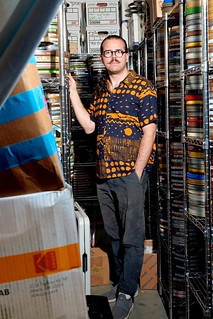 “Guess you could say I hoard,” said Tommy José Stathes as he maneuvered around the shelves of his storage unit. Large enough to accommodate a minivan, it was stuffed with thousands of film canisters stacked floor to ceiling, arranged by studio and labeled with Sharpie. “Bray: Farmer Alfalfa Sees New York,” one read. Another said: “Fleischer: Adventures of Popeye (1935).”
“Guess you could say I hoard,” said Tommy José Stathes as he maneuvered around the shelves of his storage unit. Large enough to accommodate a minivan, it was stuffed with thousands of film canisters stacked floor to ceiling, arranged by studio and labeled with Sharpie. “Bray: Farmer Alfalfa Sees New York,” one read. Another said: “Fleischer: Adventures of Popeye (1935).”
“Oh,” he muttered absently as he paused before a tower of brass movie cans, “what do we have here?”
Once a week, Mr. Stathes heads from his small studio apartment in Queens to his enormous collection of vintage cartoons: a celluloid library of around 4,000 reels, some of the prints more than 100 years old. It is certainly one of the largest collections of early animated films anywhere in the world — and that accounts for the holdings of the Library of Congress, according to an archivist who does restoration there.
THE $100,000 GOODWILL STORE VASE
This one has really gone viral this week - the $3.99 Goodwill store purchase worth $100,000. It's also a story of condition, condition, condition - the vase would have been worth far less with a single scratch or chip. Another New York Times piece. Here's an excerpt. -Editor
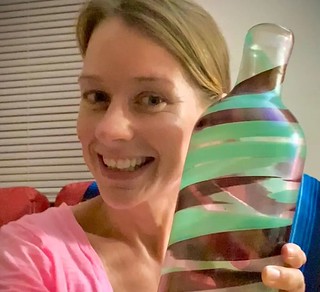 Jessica Vincent made her way in June through a busy Goodwill thrift store in Hanover County, Va., passing VCRs, lamps and glassware commonly sold at big-box retailers. Nothing really caught her eye until she saw an iridescent glass vase.
Jessica Vincent made her way in June through a busy Goodwill thrift store in Hanover County, Va., passing VCRs, lamps and glassware commonly sold at big-box retailers. Nothing really caught her eye until she saw an iridescent glass vase.
There was no price on the vase. Ms. Vincent, 43, told herself she’d pay $8.99 and no more. When the cashier rang her up, it was $3.99.
THE WILD RIDE OF COLLECTIBLES
Finally, here's the inevitable downer report from NPR's Marketplace about the slowing of the pandemic-fueled hot market for collectibles. -Editor
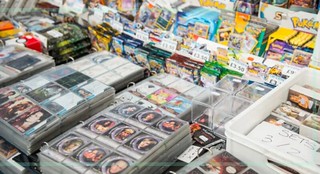 Stocks, bonds, real estate and other mainstream investments get a lot of attention in financial media. But there’s also an entire world of niche investments people park their money in — think collectibles, wine, art and other alternatives to the mainstream options.
Stocks, bonds, real estate and other mainstream investments get a lot of attention in financial media. But there’s also an entire world of niche investments people park their money in — think collectibles, wine, art and other alternatives to the mainstream options.
Marketplace interviewed a few of these investors back in 2019. Today, many of those same investors say the pandemic has caused them to re-think whether those investments are worth it.
About 13 years ago, Nate Tobik was helping his parents move out of their old house. He and his wife were about to have their first kid, so he pulled some of his old Lego sets out of the attic. Over the next few years, Tobik and his family started putting those sets together.
JENNY LIND AND “SWIFT-MANIA”
Scott Miller published an American Numismatic Society Pocket Change blog article on the echoes of the 19th century Jenny Lind mania in the Taylor Swift frenzy today. -Editor
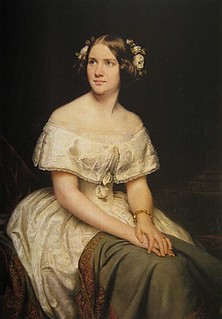 Earlier this year, the news media widely reported issues that arose with tickets to concerts to be given by the singer Taylor Swift. Coverage was given to the frustrations experienced by many fans trying to obtain tickets to her performances, as well as to their extreme devotion to the singer. This is nothing new. For most of the twentieth century, popular singers were idolized by their young fans, often to the bewilderment, or chagrin of their parents. It seems that every ten or twenty years a new figure emerged: Rudy Vallée, Frank Sinatra, Elvis Presley, the Beatles, and most recently Taylor Swift. The nineteenth century was no exception to this, though one figure stands high above the rest — Jenny Lind.
Earlier this year, the news media widely reported issues that arose with tickets to concerts to be given by the singer Taylor Swift. Coverage was given to the frustrations experienced by many fans trying to obtain tickets to her performances, as well as to their extreme devotion to the singer. This is nothing new. For most of the twentieth century, popular singers were idolized by their young fans, often to the bewilderment, or chagrin of their parents. It seems that every ten or twenty years a new figure emerged: Rudy Vallée, Frank Sinatra, Elvis Presley, the Beatles, and most recently Taylor Swift. The nineteenth century was no exception to this, though one figure stands high above the rest — Jenny Lind.
Although little is known about her by the general public today, Jenny Lind was one of the most celebrated and popular singers in the mid-nineteenth century, with a world-wide following that could only be thought of in terms of her modern counterparts. Generally known as the Swedish Nightingale, Jenny Lind was brought to the United States for a series of concerts by P. T. Barnum, whose Museum was a popular attraction in lower Manhattan. Although he had never actually heard her sing, Barnum offered Miss Lind a very generous contract based solely on her reputation as an artiste and public benefactor. News of the concert tour was first published in the American newspapers on February 11, 1850. The contract called for 150 concerts for which Barnum would pay Lind $1000 each, plus expenses, which included a companion, her accompanist and conductor, Julius Benedict, and the baritone Giovanni Belletti.
LOOSE CHANGE: DECEMBER 24, 2023
Here are some additional items in the media this week that may be of interest. -Editor
We may be getting closer to learning what coins and other treasures are in the wreck of the San Jose. -Editor
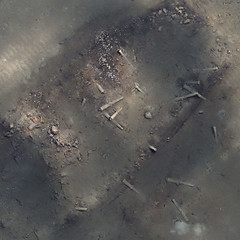 The Colombian government said Thursday it will try to raise objects from the 1708 shipwreck of the galleon San Jose, which is believed to contain a cargo worth billions of dollars.
The Colombian government said Thursday it will try to raise objects from the 1708 shipwreck of the galleon San Jose, which is believed to contain a cargo worth billions of dollars.
The 300-year-old wreck, often called the “holy grail of shipwrecks,” has been controversial, because it is both an archaeological and economic treasure.
But the ship is believed to hold 11 million gold and silver coins, emeralds and other precious cargo from Spanish-controlled colonies, which could be worth billions of dollars if ever recovered.
To read the complete article, see:
Colombia will try to raise objects from a 1708 shipwreck believed to have a cargo worth billions
(https://www.nashuatelegraph.com/top-headlines/2023/12/22/colombia-will-try-to-raise-objects-from-a-1708-shipwreck-believed-to-have-a-cargo-worth-billions/)
To read earlier E-Sylum articles, see:
FINDING SHIPWRECKS IS GETTING EASIER AND HARDER
(https://www.coinbooks.org/esylum_v18n49a27.html)
SPANISH GALLEON SAN JOSE FOUND
(https://www.coinbooks.org/v21/esylum_v21n22a38.html)
Other topics this week include dollar bill folding. -Editor
OTIS KAYE’S HOLIDAY TREE OF MONEY
Steve Roach published a Coin World article about Sotheby’s private offering of a work of money art by Otis Kaye - see the link below to read it. Here's some information from the brochure. -Editor

